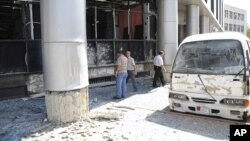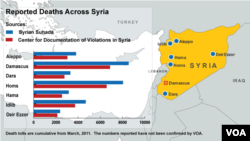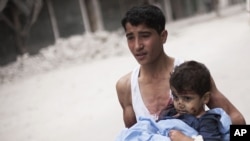CAIRO —
A group that claims to have ties to al-Qaida says it carried out twin suicide car bombings against a Syrian government intelligence headquarters in a Damascus suburb early Tuesday.
Meanwhile, Syrian state TV said government forces have captured the rebel-held district of Khalidiya inside the long fought-over city of Homs. Rebel commander Qassem Saad'eddin said the government was gaining ground as rebels ran out of ammunition.
The bombings came as government forces continued their offensive against the rebel Free Syrian Army, recapturing large chunks of the flashpoint city of Homs and as U.N. Secretary-General Ban Ki-moon called on the Syrian government to implement an "immediate cease-fire."
Amateur videos showed what appeared to be a Syrian air dorce Intelligence compound on fire after several powerful blasts in the Damascus suburb of Harasta. A group calling itself the al-Nusrat Front claimed responsibility for what it said were two suicide car bombs.
Rami Abd al-Rahman of the opposition Syrian Observatory for Human Rights said that the bombings inflicted serious casualties on government forces, but may also have killed many prisoners.
Al-Rahman said that dozens of government troops were killed by the blasts and that many fear for the fate of prisoners held in an air force security compound that was hit. He added that hundreds and possibly thousands of opposition detainees may have been inside the building.
There was no official government comment on the incidents. The casualty reports could not be independently verified as journalists are restricted from operating in Syria.
Fighting in Homs
Meanwhile, Syrian state TV said government forces have captured the rebel-held district of Khalidiya inside the long fought-over city of Homs. Rebel commander Qassem Saad'eddin said the government was gaining ground as rebels ran out of ammunition.
Opposition activists told Arab TV channels that "pockets of resistance remain," but that the rebels made a "tactical decision" to withdraw from several areas.
Riad Kahwaji, who heads the Institute for Near East and Gulf Military Analysis, said that the rebels are fighting a guerrilla war against government forces, which implies withdrawing and attacking again at an opportune time.
"We cannot really say here that we are talking about conventional armies confronting each other and with one losing ground and the other moving in," Kahwaji said. "This is a regular army against rebel guerillas who retreat and attack when the opportunity arises."
Arab media reported on Tuesday that Lebanon's Hezbollah has been fighting alongside Syrian troops in Homs. The Free Syrian Army said it is holding a number of Hezbollah fighters prisoner in Syria and is threatening to attack Hezbollah targets inside Lebanon.
UN warning
In Paris on Tuesday, the U.N. secretary-general voiced alarm at the rising violence in Syria and he issued another warning against those who aim to fuel it.
"At this time, I would urge again those countries who are providing arms to both sides should stop," Ban said. "Following this military equipment and also for the militarization will put the Syrian people only more miserable situations. And this is not an option. The only option available is a political resolution through political dialogue led by the Syrian people."
After meeting Ban, French President Francois Hollande urged tougher sanctions against the Syrian government and raised concerns about the fallout of Syria's violence in Lebanon and Turkey.
- Bryant reported from Paris.






